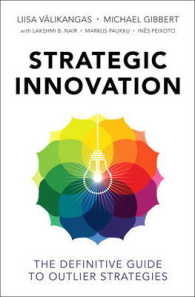- ホーム
- > 洋書
- > 英文書
- > Philosophy
Full Description
Responsibility & Desert advances a conversational theory of moral responsibility that relies upon desert as the normative basis for blame and punishment. A conversational theory understands the relationship between a blameworthy person and one who blames her to be similar to the relationship between competent speakers engaged in a conversational exchange. Blame can therefore be appraised for being meaningful as a reply to a culpable party's conduct. But meaningfulness alone is inadequate to justify blame and punishment. Might one appeal to fairness, reasonableness, or just utility?
Desert is widely regarded as the proper basis for blame and punishment. But is this a philosophically defensible position? Philosopher Michael McKenna explores just what desert is within the domain of moral responsibility, when conceptualized within the framework of the conversational theory. He does not offer an unqualified defence, but he does offer a best case for treating desert as the proper basis for the communicative character of blame and punishment. To do so, he takes up familiar challenges to desert and retribution. Does deserved blame and punishment commit us to the non-instrumental goodness of harms to the blameworthy and criminally culpable? Is this mere vengeance? Does it also commit us to extremely harsh treatment in response to extremely egregious wrongdoing? McKenna does not shy away from accepting hard truths about appeal to desert, but he does show that many of the most damning indictments of it are misguided.
Contents
Chapter 1: Introduction
Part I The View
Chapter 2: Directed Blame and Conversation
Chapter 3: Basically Deserved Blame and Its Value1
Chapter 4: Punishment and the Value of Deserved Suffering
Part II Clarifications and Further Developments
Chapter 5: The Free Will Debate and Basic Desert
Chapter 6: Fittingness as a Pitiful Intellectualist Trinket?
Chapter 7: Guilt and Self-Blame
Part III Interrogating the Proposal
Chapter 8: The Attenuated Role of the Hostile Emotions
Chapter 9: Power, Social Inequities, and the Conversational Theory
Chapter 10: Wimpy Retributivism and the Promise of Moral Influence Theories
Chapter 11: Conclusion
-

- DVD
- ザ・イースト
-

- 電子書籍
- クドリャフカの順番 角川文庫






